Organisational Behaviour Project 2: British Gas Team Dynamics
VerifiedAdded on 2020/07/23
|9
|2623
|63
Project
AI Summary
This project analyzes organisational behaviour within British Gas, focusing on effective and ineffective teams, and explores relevant team development theories. It examines the application of organisational behaviour concepts and philosophies, such as individual differences, motivation, and ethics, and discusses the impact of these elements on work culture. The project also delves into team development stages according to Tuckman's model, including forming, storming, norming, performing, and adjourning, highlighting the roles of leadership and team members at each stage. Furthermore, the project evaluates the relevance of team development theories, organisational behaviour concepts, and philosophies in influencing work culture, emphasizing the importance of problem-solving teams, quality teams, and virtual teams within the context of British Gas. The conclusion emphasizes the significance of organisational behaviour in establishing an effective work culture and achieving organisational objectives.
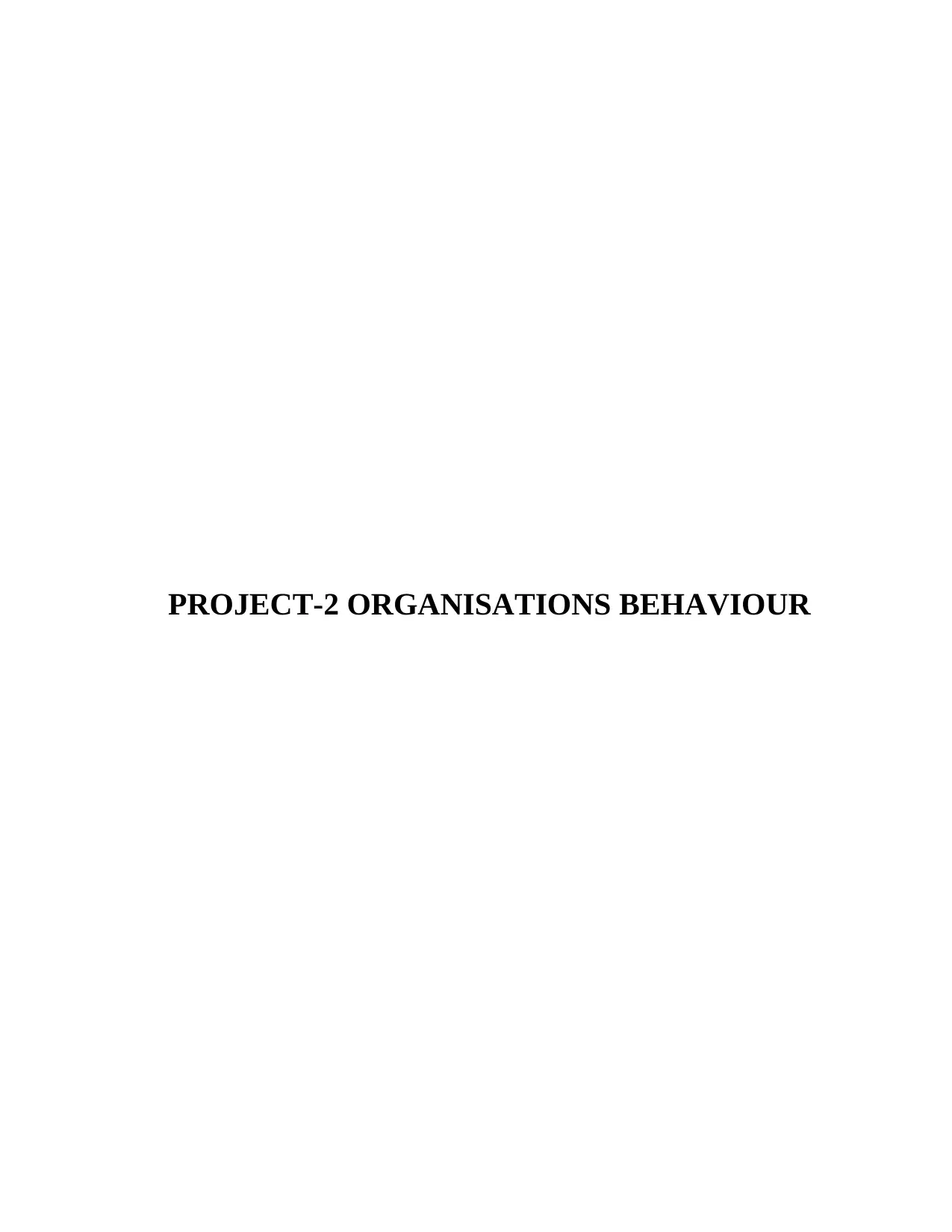
PROJECT-2 ORGANISATIONS BEHAVIOUR
Paraphrase This Document
Need a fresh take? Get an instant paraphrase of this document with our AI Paraphraser

Table of Contents
INTRODUCTION...........................................................................................................................1
Task 1...............................................................................................................................................1
P.3 Effective team as opposed to an ineffective team in British Gas.....................................1
M3 Relevant team and groups development theories to support groups................................2
P.4 Applications of Concept and philosophies of organisational behaviour in British gas . .4
D.2 Analysis and evaluate the relevance of team development theories of organisation
behavioural concepts and philosophies that influence work culture......................................5
CONCLUSIONS..............................................................................................................................6
REFERENCES................................................................................................................................7
INTRODUCTION...........................................................................................................................1
Task 1...............................................................................................................................................1
P.3 Effective team as opposed to an ineffective team in British Gas.....................................1
M3 Relevant team and groups development theories to support groups................................2
P.4 Applications of Concept and philosophies of organisational behaviour in British gas . .4
D.2 Analysis and evaluate the relevance of team development theories of organisation
behavioural concepts and philosophies that influence work culture......................................5
CONCLUSIONS..............................................................................................................................6
REFERENCES................................................................................................................................7
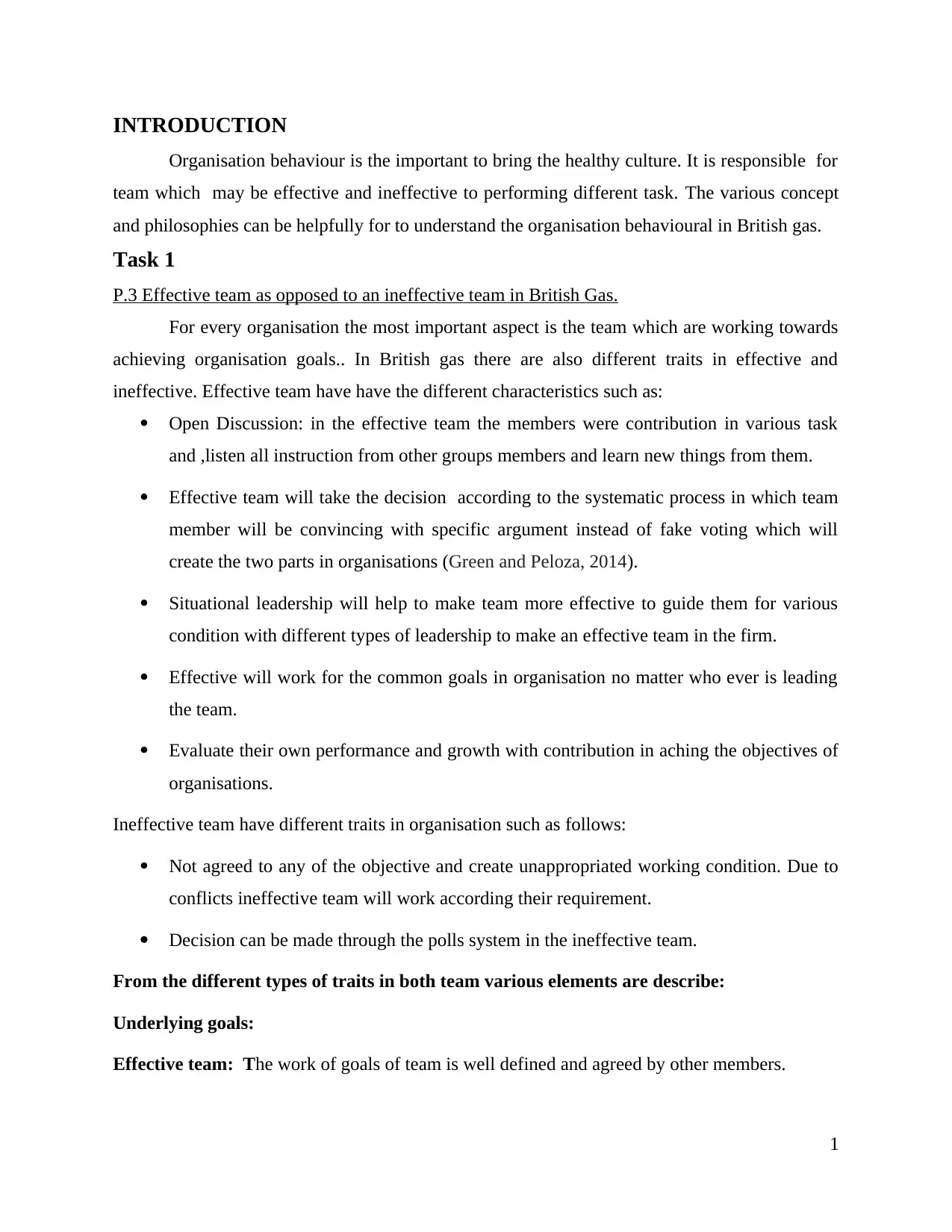
INTRODUCTION
Organisation behaviour is the important to bring the healthy culture. It is responsible for
team which may be effective and ineffective to performing different task. The various concept
and philosophies can be helpfully for to understand the organisation behavioural in British gas.
Task 1
P.3 Effective team as opposed to an ineffective team in British Gas.
For every organisation the most important aspect is the team which are working towards
achieving organisation goals.. In British gas there are also different traits in effective and
ineffective. Effective team have have the different characteristics such as:
Open Discussion: in the effective team the members were contribution in various task
and ,listen all instruction from other groups members and learn new things from them.
Effective team will take the decision according to the systematic process in which team
member will be convincing with specific argument instead of fake voting which will
create the two parts in organisations (Green and Peloza, 2014).
Situational leadership will help to make team more effective to guide them for various
condition with different types of leadership to make an effective team in the firm.
Effective will work for the common goals in organisation no matter who ever is leading
the team.
Evaluate their own performance and growth with contribution in aching the objectives of
organisations.
Ineffective team have different traits in organisation such as follows:
Not agreed to any of the objective and create unappropriated working condition. Due to
conflicts ineffective team will work according their requirement.
Decision can be made through the polls system in the ineffective team.
From the different types of traits in both team various elements are describe:
Underlying goals:
Effective team: The work of goals of team is well defined and agreed by other members.
1
Organisation behaviour is the important to bring the healthy culture. It is responsible for
team which may be effective and ineffective to performing different task. The various concept
and philosophies can be helpfully for to understand the organisation behavioural in British gas.
Task 1
P.3 Effective team as opposed to an ineffective team in British Gas.
For every organisation the most important aspect is the team which are working towards
achieving organisation goals.. In British gas there are also different traits in effective and
ineffective. Effective team have have the different characteristics such as:
Open Discussion: in the effective team the members were contribution in various task
and ,listen all instruction from other groups members and learn new things from them.
Effective team will take the decision according to the systematic process in which team
member will be convincing with specific argument instead of fake voting which will
create the two parts in organisations (Green and Peloza, 2014).
Situational leadership will help to make team more effective to guide them for various
condition with different types of leadership to make an effective team in the firm.
Effective will work for the common goals in organisation no matter who ever is leading
the team.
Evaluate their own performance and growth with contribution in aching the objectives of
organisations.
Ineffective team have different traits in organisation such as follows:
Not agreed to any of the objective and create unappropriated working condition. Due to
conflicts ineffective team will work according their requirement.
Decision can be made through the polls system in the ineffective team.
From the different types of traits in both team various elements are describe:
Underlying goals:
Effective team: The work of goals of team is well defined and agreed by other members.
1
⊘ This is a preview!⊘
Do you want full access?
Subscribe today to unlock all pages.

Trusted by 1+ million students worldwide
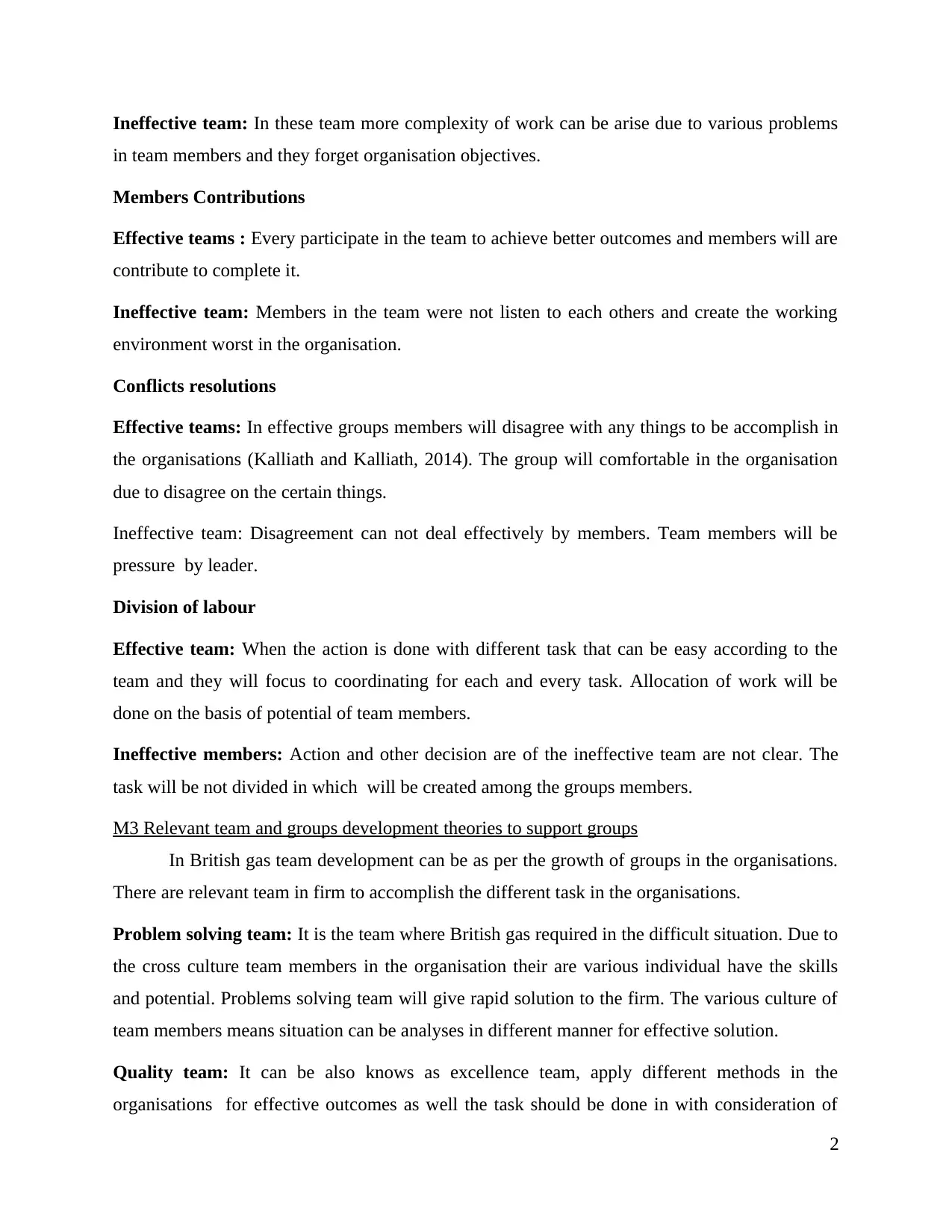
Ineffective team: In these team more complexity of work can be arise due to various problems
in team members and they forget organisation objectives.
Members Contributions
Effective teams : Every participate in the team to achieve better outcomes and members will are
contribute to complete it.
Ineffective team: Members in the team were not listen to each others and create the working
environment worst in the organisation.
Conflicts resolutions
Effective teams: In effective groups members will disagree with any things to be accomplish in
the organisations (Kalliath and Kalliath, 2014). The group will comfortable in the organisation
due to disagree on the certain things.
Ineffective team: Disagreement can not deal effectively by members. Team members will be
pressure by leader.
Division of labour
Effective team: When the action is done with different task that can be easy according to the
team and they will focus to coordinating for each and every task. Allocation of work will be
done on the basis of potential of team members.
Ineffective members: Action and other decision are of the ineffective team are not clear. The
task will be not divided in which will be created among the groups members.
M3 Relevant team and groups development theories to support groups
In British gas team development can be as per the growth of groups in the organisations.
There are relevant team in firm to accomplish the different task in the organisations.
Problem solving team: It is the team where British gas required in the difficult situation. Due to
the cross culture team members in the organisation their are various individual have the skills
and potential. Problems solving team will give rapid solution to the firm. The various culture of
team members means situation can be analyses in different manner for effective solution.
Quality team: It can be also knows as excellence team, apply different methods in the
organisations for effective outcomes as well the task should be done in with consideration of
2
in team members and they forget organisation objectives.
Members Contributions
Effective teams : Every participate in the team to achieve better outcomes and members will are
contribute to complete it.
Ineffective team: Members in the team were not listen to each others and create the working
environment worst in the organisation.
Conflicts resolutions
Effective teams: In effective groups members will disagree with any things to be accomplish in
the organisations (Kalliath and Kalliath, 2014). The group will comfortable in the organisation
due to disagree on the certain things.
Ineffective team: Disagreement can not deal effectively by members. Team members will be
pressure by leader.
Division of labour
Effective team: When the action is done with different task that can be easy according to the
team and they will focus to coordinating for each and every task. Allocation of work will be
done on the basis of potential of team members.
Ineffective members: Action and other decision are of the ineffective team are not clear. The
task will be not divided in which will be created among the groups members.
M3 Relevant team and groups development theories to support groups
In British gas team development can be as per the growth of groups in the organisations.
There are relevant team in firm to accomplish the different task in the organisations.
Problem solving team: It is the team where British gas required in the difficult situation. Due to
the cross culture team members in the organisation their are various individual have the skills
and potential. Problems solving team will give rapid solution to the firm. The various culture of
team members means situation can be analyses in different manner for effective solution.
Quality team: It can be also knows as excellence team, apply different methods in the
organisations for effective outcomes as well the task should be done in with consideration of
2
Paraphrase This Document
Need a fresh take? Get an instant paraphrase of this document with our AI Paraphraser
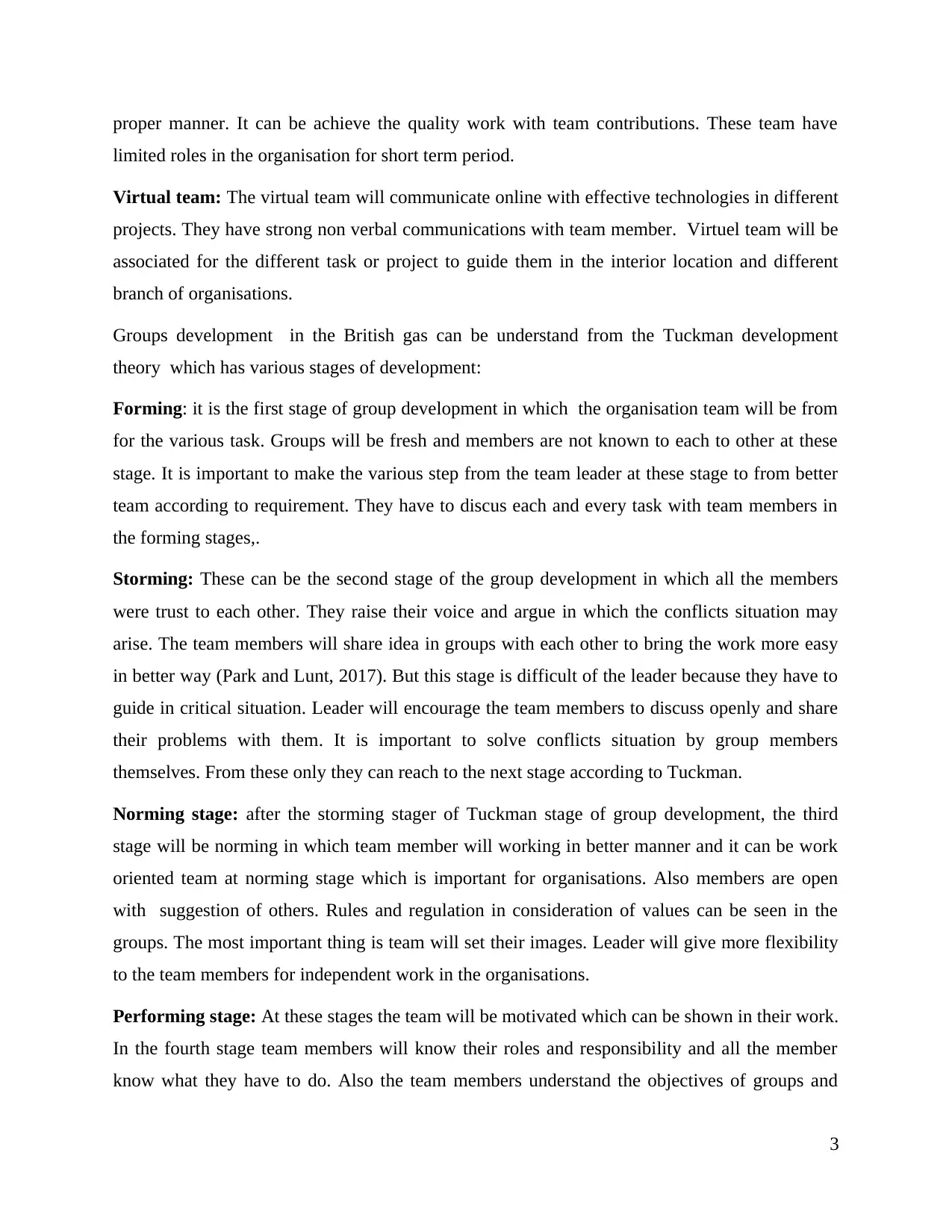
proper manner. It can be achieve the quality work with team contributions. These team have
limited roles in the organisation for short term period.
Virtual team: The virtual team will communicate online with effective technologies in different
projects. They have strong non verbal communications with team member. Virtuel team will be
associated for the different task or project to guide them in the interior location and different
branch of organisations.
Groups development in the British gas can be understand from the Tuckman development
theory which has various stages of development:
Forming: it is the first stage of group development in which the organisation team will be from
for the various task. Groups will be fresh and members are not known to each to other at these
stage. It is important to make the various step from the team leader at these stage to from better
team according to requirement. They have to discus each and every task with team members in
the forming stages,.
Storming: These can be the second stage of the group development in which all the members
were trust to each other. They raise their voice and argue in which the conflicts situation may
arise. The team members will share idea in groups with each other to bring the work more easy
in better way (Park and Lunt, 2017). But this stage is difficult of the leader because they have to
guide in critical situation. Leader will encourage the team members to discuss openly and share
their problems with them. It is important to solve conflicts situation by group members
themselves. From these only they can reach to the next stage according to Tuckman.
Norming stage: after the storming stager of Tuckman stage of group development, the third
stage will be norming in which team member will working in better manner and it can be work
oriented team at norming stage which is important for organisations. Also members are open
with suggestion of others. Rules and regulation in consideration of values can be seen in the
groups. The most important thing is team will set their images. Leader will give more flexibility
to the team members for independent work in the organisations.
Performing stage: At these stages the team will be motivated which can be shown in their work.
In the fourth stage team members will know their roles and responsibility and all the member
know what they have to do. Also the team members understand the objectives of groups and
3
limited roles in the organisation for short term period.
Virtual team: The virtual team will communicate online with effective technologies in different
projects. They have strong non verbal communications with team member. Virtuel team will be
associated for the different task or project to guide them in the interior location and different
branch of organisations.
Groups development in the British gas can be understand from the Tuckman development
theory which has various stages of development:
Forming: it is the first stage of group development in which the organisation team will be from
for the various task. Groups will be fresh and members are not known to each to other at these
stage. It is important to make the various step from the team leader at these stage to from better
team according to requirement. They have to discus each and every task with team members in
the forming stages,.
Storming: These can be the second stage of the group development in which all the members
were trust to each other. They raise their voice and argue in which the conflicts situation may
arise. The team members will share idea in groups with each other to bring the work more easy
in better way (Park and Lunt, 2017). But this stage is difficult of the leader because they have to
guide in critical situation. Leader will encourage the team members to discuss openly and share
their problems with them. It is important to solve conflicts situation by group members
themselves. From these only they can reach to the next stage according to Tuckman.
Norming stage: after the storming stager of Tuckman stage of group development, the third
stage will be norming in which team member will working in better manner and it can be work
oriented team at norming stage which is important for organisations. Also members are open
with suggestion of others. Rules and regulation in consideration of values can be seen in the
groups. The most important thing is team will set their images. Leader will give more flexibility
to the team members for independent work in the organisations.
Performing stage: At these stages the team will be motivated which can be shown in their work.
In the fourth stage team members will know their roles and responsibility and all the member
know what they have to do. Also the team members understand the objectives of groups and
3

support to fulfils in limited time. Without guiding of leader team will perform effective and
efficiently at these stages.
Adjourning: after accomplish the task in organisation team will be dissolved at these stage. The
attachment of team members will be more with each other and high chance of anxiety can be
seen in adjourning stages (Gaggiotti, Kostera and Krzyworzeka, 2016). Leader will appreciate to
all the team members for their effective contribution in the task and get the better outcomes.
P.4 Applications of Concept and philosophies of organisational behaviour in British gas
The concept of organisation behavioural element such as :
Nature of people
Nature of the organisations.
Nature of people can be their individual qualities of a person or traits of that shows to became
same. At the organisations level some factors affect to nature of people they are as follows:
Individual difference: it is an approach of managerial towards each employees
individual (Hollebeek, 2013). It can be measure to one to one approach and not on the basis of
statistical approach.
Perception: it is an unique ability to observe and easily listen to all the things in the organisations
which can be necessary in each and every individual.
Motivation behaviour: it can be help to bring the employees to boost energy for working in
difficulty situation and create the positive environment in organisations (Cronin and Müller,
2012.).
Values person: If these concept can be applied in the organisation to give values and appreciated
for their skills and abilities to contribute in the organisations and development and growth.
Nature of organisations: It can state the motivation of the organisations. It can give more
opportunity to expanded the business Global market. It can be also define the employee
standard. The employee act for organisation to achieve objective.
Social system: for British gas these can be the most important aspect in which relationship with
other firm can give higher opportunity. It can be two types formal and informal
Mutual interest which can be applied in the organisation for the different needs of people the
better more and more can be the effective (Du Plessis, Wakelin and Nel, 2015). The more can be
benefits basically it is mutual understanding between the firm and worker that will be
contribution in achieving organisational objectives.
4
efficiently at these stages.
Adjourning: after accomplish the task in organisation team will be dissolved at these stage. The
attachment of team members will be more with each other and high chance of anxiety can be
seen in adjourning stages (Gaggiotti, Kostera and Krzyworzeka, 2016). Leader will appreciate to
all the team members for their effective contribution in the task and get the better outcomes.
P.4 Applications of Concept and philosophies of organisational behaviour in British gas
The concept of organisation behavioural element such as :
Nature of people
Nature of the organisations.
Nature of people can be their individual qualities of a person or traits of that shows to became
same. At the organisations level some factors affect to nature of people they are as follows:
Individual difference: it is an approach of managerial towards each employees
individual (Hollebeek, 2013). It can be measure to one to one approach and not on the basis of
statistical approach.
Perception: it is an unique ability to observe and easily listen to all the things in the organisations
which can be necessary in each and every individual.
Motivation behaviour: it can be help to bring the employees to boost energy for working in
difficulty situation and create the positive environment in organisations (Cronin and Müller,
2012.).
Values person: If these concept can be applied in the organisation to give values and appreciated
for their skills and abilities to contribute in the organisations and development and growth.
Nature of organisations: It can state the motivation of the organisations. It can give more
opportunity to expanded the business Global market. It can be also define the employee
standard. The employee act for organisation to achieve objective.
Social system: for British gas these can be the most important aspect in which relationship with
other firm can give higher opportunity. It can be two types formal and informal
Mutual interest which can be applied in the organisation for the different needs of people the
better more and more can be the effective (Du Plessis, Wakelin and Nel, 2015). The more can be
benefits basically it is mutual understanding between the firm and worker that will be
contribution in achieving organisational objectives.
4
⊘ This is a preview!⊘
Do you want full access?
Subscribe today to unlock all pages.

Trusted by 1+ million students worldwide

Ethics: The moral values of an person in a groups and firm. If the British gas wants to attract
the employees to accomplish the better situations and behavioural of the organisations.
The philosophies an organisation can apply in the organisations:
Autocratic: It can be depends upon strength, power and formal authority. In it can be
applied for the small authority (Audzeyeva, Summers and Schenk-Hoppé, 2012). The
lower level employees have some control over the task. The new way of doing task in
key decision which can be made.
Custodial: it can give secularity to the employees inn terms of better wages and salary
with other benefits. It can be reweds and recognition given to them to retain from
organisations.
Supportive: this can be focusing on the ambitious leadership. It not on the basis of
delegation and authority but it will be responsible to motivate the employees their top
management effective relationship.
Collegial: This can be applied to work all the employees as colleagues. The working
environment can be more effective with healthy cultures by contribution of all the team
members in organisations.
System: it will applied to bring the organisation structure and proper system with
effective team to considered as different goals and objectives.
D.2 Analysis and evaluate the relevance of team development theories of organisation
behavioural concepts and philosophies that influence work culture.
The most important aspect is the relevance of team which can be influence to the work
culture in firm due to in effective concept and model can be applied to solve the such issues. It
have to deal with various situation arise in the British gas (Ashby, 2013). The working culture of
grim will be makes the goodwill in the society. If the organisation have the problems solving
team to make better solution in firm for effective outcomes. If the nature of people and nature of
organisation can be applied successful for the influence work culture. It is important to applied
philosophies such as autocratic which can be considered all the strengthen and weakness with
authority in from top to bottom level management. If the British gas will be applied system
5
the employees to accomplish the better situations and behavioural of the organisations.
The philosophies an organisation can apply in the organisations:
Autocratic: It can be depends upon strength, power and formal authority. In it can be
applied for the small authority (Audzeyeva, Summers and Schenk-Hoppé, 2012). The
lower level employees have some control over the task. The new way of doing task in
key decision which can be made.
Custodial: it can give secularity to the employees inn terms of better wages and salary
with other benefits. It can be reweds and recognition given to them to retain from
organisations.
Supportive: this can be focusing on the ambitious leadership. It not on the basis of
delegation and authority but it will be responsible to motivate the employees their top
management effective relationship.
Collegial: This can be applied to work all the employees as colleagues. The working
environment can be more effective with healthy cultures by contribution of all the team
members in organisations.
System: it will applied to bring the organisation structure and proper system with
effective team to considered as different goals and objectives.
D.2 Analysis and evaluate the relevance of team development theories of organisation
behavioural concepts and philosophies that influence work culture.
The most important aspect is the relevance of team which can be influence to the work
culture in firm due to in effective concept and model can be applied to solve the such issues. It
have to deal with various situation arise in the British gas (Ashby, 2013). The working culture of
grim will be makes the goodwill in the society. If the organisation have the problems solving
team to make better solution in firm for effective outcomes. If the nature of people and nature of
organisation can be applied successful for the influence work culture. It is important to applied
philosophies such as autocratic which can be considered all the strengthen and weakness with
authority in from top to bottom level management. If the British gas will be applied system
5
Paraphrase This Document
Need a fresh take? Get an instant paraphrase of this document with our AI Paraphraser
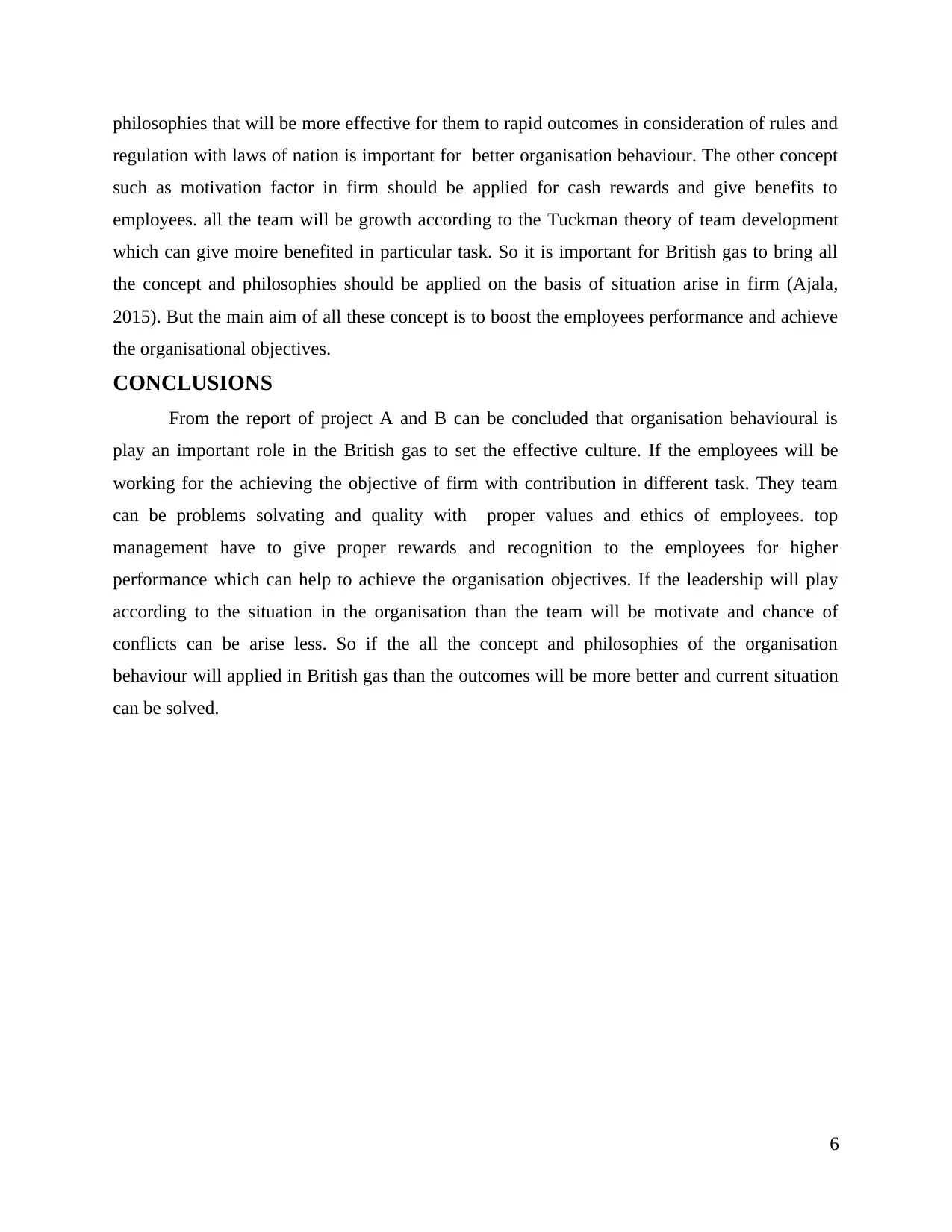
philosophies that will be more effective for them to rapid outcomes in consideration of rules and
regulation with laws of nation is important for better organisation behaviour. The other concept
such as motivation factor in firm should be applied for cash rewards and give benefits to
employees. all the team will be growth according to the Tuckman theory of team development
which can give moire benefited in particular task. So it is important for British gas to bring all
the concept and philosophies should be applied on the basis of situation arise in firm (Ajala,
2015). But the main aim of all these concept is to boost the employees performance and achieve
the organisational objectives.
CONCLUSIONS
From the report of project A and B can be concluded that organisation behavioural is
play an important role in the British gas to set the effective culture. If the employees will be
working for the achieving the objective of firm with contribution in different task. They team
can be problems solvating and quality with proper values and ethics of employees. top
management have to give proper rewards and recognition to the employees for higher
performance which can help to achieve the organisation objectives. If the leadership will play
according to the situation in the organisation than the team will be motivate and chance of
conflicts can be arise less. So if the all the concept and philosophies of the organisation
behaviour will applied in British gas than the outcomes will be more better and current situation
can be solved.
6
regulation with laws of nation is important for better organisation behaviour. The other concept
such as motivation factor in firm should be applied for cash rewards and give benefits to
employees. all the team will be growth according to the Tuckman theory of team development
which can give moire benefited in particular task. So it is important for British gas to bring all
the concept and philosophies should be applied on the basis of situation arise in firm (Ajala,
2015). But the main aim of all these concept is to boost the employees performance and achieve
the organisational objectives.
CONCLUSIONS
From the report of project A and B can be concluded that organisation behavioural is
play an important role in the British gas to set the effective culture. If the employees will be
working for the achieving the objective of firm with contribution in different task. They team
can be problems solvating and quality with proper values and ethics of employees. top
management have to give proper rewards and recognition to the employees for higher
performance which can help to achieve the organisation objectives. If the leadership will play
according to the situation in the organisation than the team will be motivate and chance of
conflicts can be arise less. So if the all the concept and philosophies of the organisation
behaviour will applied in British gas than the outcomes will be more better and current situation
can be solved.
6

REFERENCES
Books and journals
Ajala, E. M., 2015. The influence of organisational justice on employees' commitment in
manufacturing firms in Oyo State, Nigeria: Implications for industrial social work. African
Journal of Social Work. 5(1). pp.92-130.
Ashby, W., 2013. Design for a brain: The origin of adaptive behaviour. Springer Science &
Business Media.
Audzeyeva, A., Summers, B. and Schenk-Hoppé, K.R., 2012. Forecasting customer behaviour in
a multi-service financial organisation: A profitability perspective. International journal of
forecasting.28(2). pp.507-518.
Cronin, L. and Müller, A., 2012. From serendipity to design of polyoxometalates at the
nanoscale, aesthetic beauty and applications. Chemical Society Reviews.41(22). pp.7333-7334.
Du Plessis, M., Wakelin, Z. and Nel, P., 2015. The influence of emotional intelligence and trust
on servant leadership. SA Journal of Industrial Psychology. 41(1). pp.01-09.
Gaggiotti, H., Kostera, M. and Krzyworzeka, P., 2016. More than a method? Organisational
ethnography as a way of imagining the social. Culture and Organization. pp.1-16.
Green, T. and Peloza, J., 2014. How do consumers infer corporate social responsibility? The role
of organisation size. Journal of Consumer Behaviour.13(4). pp.282-293.
Hollebeek, L. D., 2013. The customer engagement/value interface: An exploratory investigation.
Australasian Marketing Journal (AMJ). 21(1). pp.17-24.
Kalliath, P. and Kalliath, T., 2014. Work–family conflict: Coping strategies adopted by social
workers. Journal of Social Work Practice. 28(1). pp.111-126.
Park, S. and Lunt, N., 2017. Productive Resistance within the Korean Public Sector: Exploring
Organisational Culture. Public Organization Review. pp.1-19.
7
Books and journals
Ajala, E. M., 2015. The influence of organisational justice on employees' commitment in
manufacturing firms in Oyo State, Nigeria: Implications for industrial social work. African
Journal of Social Work. 5(1). pp.92-130.
Ashby, W., 2013. Design for a brain: The origin of adaptive behaviour. Springer Science &
Business Media.
Audzeyeva, A., Summers, B. and Schenk-Hoppé, K.R., 2012. Forecasting customer behaviour in
a multi-service financial organisation: A profitability perspective. International journal of
forecasting.28(2). pp.507-518.
Cronin, L. and Müller, A., 2012. From serendipity to design of polyoxometalates at the
nanoscale, aesthetic beauty and applications. Chemical Society Reviews.41(22). pp.7333-7334.
Du Plessis, M., Wakelin, Z. and Nel, P., 2015. The influence of emotional intelligence and trust
on servant leadership. SA Journal of Industrial Psychology. 41(1). pp.01-09.
Gaggiotti, H., Kostera, M. and Krzyworzeka, P., 2016. More than a method? Organisational
ethnography as a way of imagining the social. Culture and Organization. pp.1-16.
Green, T. and Peloza, J., 2014. How do consumers infer corporate social responsibility? The role
of organisation size. Journal of Consumer Behaviour.13(4). pp.282-293.
Hollebeek, L. D., 2013. The customer engagement/value interface: An exploratory investigation.
Australasian Marketing Journal (AMJ). 21(1). pp.17-24.
Kalliath, P. and Kalliath, T., 2014. Work–family conflict: Coping strategies adopted by social
workers. Journal of Social Work Practice. 28(1). pp.111-126.
Park, S. and Lunt, N., 2017. Productive Resistance within the Korean Public Sector: Exploring
Organisational Culture. Public Organization Review. pp.1-19.
7
⊘ This is a preview!⊘
Do you want full access?
Subscribe today to unlock all pages.

Trusted by 1+ million students worldwide
1 out of 9
Related Documents
Your All-in-One AI-Powered Toolkit for Academic Success.
+13062052269
info@desklib.com
Available 24*7 on WhatsApp / Email
![[object Object]](/_next/static/media/star-bottom.7253800d.svg)
Unlock your academic potential
Copyright © 2020–2026 A2Z Services. All Rights Reserved. Developed and managed by ZUCOL.





